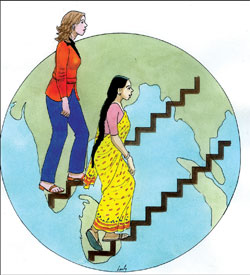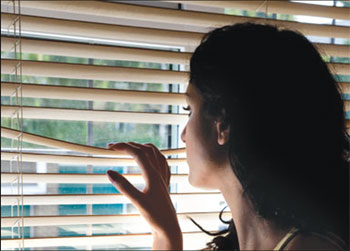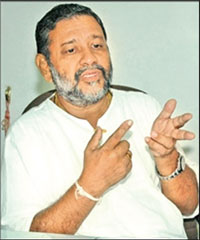|


SL making progress on gender equality
With five days into the New Year, no other time could be so perfect
as now to review the good and the bad of the past twelve months and make
a wish list for the days ahead
Aditha DISSANAYAKE
"Did you know?", asked an analyst after reading the newly released
2012 Women, Business and the Law Report, published by the World Bank
Group, "that in Togo a woman's husband can prevent her from getting a
job by informing her employers of his opposition and in Chile husbands
have the exclusive right to administer marital property, which includes
assets and earnings earned by the wife unless she can prove their
independent origin?"
 Think these are extreme situations? Think again. These are only two
examples of the "barriers stacked up against women's labor force
participation and entrepreneurship" around the world, as cataloged in
the report. Think these are extreme situations? Think again. These are only two
examples of the "barriers stacked up against women's labor force
participation and entrepreneurship" around the world, as cataloged in
the report.
The good news is, these barriers are almost non existent here in Sri
Lanka. The report reveals that to questions like "Can a
married/unmarried woman travel in Sri Lanka in the same way as a man?Can
an unmarried/married woman get a job or pursue a trade or profession in
the same way as a man? Can an unmarried/married woman register a
business in the same way as a man? Can a married woman be "head of
household" or "head of family" in the same way as a man? Do married
couples jointly share legal responsibility for the family's financial
expenses? The answers, here in Sri Lanka are "Yes".
As stated in the Social Institutions and Gender Index (SIGI) report
in the OECD website (genderindex.org)Ódespite being influenced by
patriarchal values and social norms, Sri Lanka has achieved a greater
degree of gender equality than many other developing countries. In the
1940s, the country established equal and free access to health and
education services, an important factor in achieving gender equality in
primary and secondary education. Today, women comprise the majority of
university students, although they continue to face gender barriers in
the labour market and in the political arena."
"Yes", agrees Dr. R.M.J.B Ratnayake from the Institute of Psychology
and Counseling. According to Dr. Ratnayake we live in a patriarchal
society and the gender gap is still evident especially when it comes to
technology. "An engineer or a technical officer could be a man or a
woman but the head mason, head carpenter is still always a man. Most
workers on construction sites too are men. There are still jobs in Sri
Lanka which are done only by men."
Social scientists believe customs and traditions that vary from
region to region affect Sri Lankan women in different ways. Many
sociologists feel that the year just passed has not made significant
improvements in changing the situation of women who are employed in the
"informal sector". "Poverty, coupled with political instability and
traditions of male leadership, make it difficult for them to challenge
or change their situation. War widows - an estimated 40 000 women - are
a particularly vulnerable group."
Yet, the past has not been all that unkind to the women of Sri Lanka
where early marriage is less common than in other South Asian countries,
and where polygamy is illegal.
Even though parental authority is not equally shared in Sri Lanka,
where the fathers are regarded as the natural guardians of children
while mothers are viewed as custodians and are usually given the
responsibility of the daily activities related to child-rearing, recent
judicial developments have reduced discrimination against women. Today,
in the event of divorce, unlike in the past, when men enjoyed
preferential custody rights, a new legislation emphasizes the well-being
of children, who may be placed with either parent.
Sri Lanka's Constitution provides for equal inheritance rights for
men and women, but is again sometimes superseded by other legal systems.
To quote from the SIGI report " Following the death of a father, Kandyan
law ties the inheritance rights of daughters to marital practices:
daughters who marry in diga (i.e. the bride is taken into the groom's
home) must transfer any inherited property to their brothers or to
sisters who have married in binna (i.e. the groom is taken into the
bride's home). UNESCO reports that males are also given precedence over
females in inheritance of agricultural land."
The SIGI report also states that "legislation protecting the physical
integrity of women in Sri Lanka is quite strong." Though domestic
violence, including spousal rape, is an area of concern especially as
incidents are rarely reported and legal protection has been insufficient
it is hoped that the situation may improve in the year ahead following
recent amendments to the Penal Code that strengthen measures for both
protection and prosecution.
A fact that deserves acclaim is, that "in contrast to several other
Asian countries, there is no evidence to suggest that Sri Lanka is a
country of concern in relation to missing women. Having a small family
with children of both sexes is, in fact, often expressed as more
desirable than having only sons."
When it comes to ownership rights though, things need to be improved.
As reported by the Committee on the Elimination of Discrimination
against Women (CEDAW), the Sri Lankan Land Development Ordinance of 1934
denies women in new settlements the right to own family land if they had
no land in locations of origin. Even though Sri Lankan women have access
to property other than land a study conducted by the International
Centre for Research on Women shows that most women have acquired their
assets (both land and other property) through inheritance, with purchase
being the second main source for ownership. It is only a small number of
women who have become property owners and this too is through government
programmes. Yet, in other financial matters women hold equal rights with
men. They have equal access to bank loans, mortgages and other forms of
credit from a variety of sources including the State, private financial
institutions and donor-assisted or local credit delivery
programmes.Looking beyond our own borders it was heartening to hear
Leymah Gbowee, Ellen Johnson Sirleaf, and Tawakkul Karman were the
recipients of the 2011 Nobel Peace Prize.
The Committee explained that these three women earned the prestigious
prize for their "non-violent struggle for the safety of women and for
women's rights to full participation in peace-building work" and further
stated "We cannot achieve democracy and lasting peace in the world,
unless women obtain the same opportunities as men to influence
developments at all levels of society."
Another highlight of 2011 was the end of the centuries old British
royal discrimination against women which came to a stop in late October
when Commonwealth leaders finally agreed to drop rules that give sons
precedence as heir to the British throne.
All in all, the passage of time, throughout the last twelve months,
undoubtedly indicates that the strength of the patriarchal order is
dissipating, though slowly. The Old Order has begun to change paving the
way for a new one which favors equality and justice.
From 2011, called by many feminists as an year of winners and losers,
let Time march ahead into a era with forward looking thoughts.
And in the meantime, have a happy New Year.
[email protected]
 'To do' list for the New Year 'To do' list for the New Year
Though we may not be able to achieve miracles in the year ahead we
can do one small thing each day to pave the way to utopia.
Think of feminism as a personal philosophy of equality, not something
just for activists.
If you see yourself as a feminist, let it be with you every day and
in everything you do. When asked "Are you a feminist?", simply say, "Of
course." Elaborate if they want you to. Otherwise, just go about your
business.
If you are a parent, ask yourself if you have different expectations
of your children based on their sex. If you are a teacher, pay attention
to how you treat boys and girls or people of different ethnicities
differently.
Make a conscious effort to show equality in all aspects of life.
The World Development Report 2012
Countries that create better opportunities and conditions for women
and girls can raise productivity, improve outcomes for children, make
institutions more representative, and advance development prospects for
all, says a new World Bank flagship report.
The World Development Report 2012: Gender Equality and Development
details big strides in narrowing gender gaps but shows that disparities
remain in many areas.
 The worst disparity is the rate at which girls and women die relative
to men in developing countries: Globally, excess female mortality after
birth and "missing" girls at birth account for an estimated 3.9 million
women each year in low- and middle-income countries. About two-fifths
are never born due to a preference for sons, a sixth die in early
childhood, and over a third die in their reproductive years. These
losses are growing in Sub-Saharan Africa, especially in countries
hard-hit by HIV/AIDS. The worst disparity is the rate at which girls and women die relative
to men in developing countries: Globally, excess female mortality after
birth and "missing" girls at birth account for an estimated 3.9 million
women each year in low- and middle-income countries. About two-fifths
are never born due to a preference for sons, a sixth die in early
childhood, and over a third die in their reproductive years. These
losses are growing in Sub-Saharan Africa, especially in countries
hard-hit by HIV/AIDS.
"We need to achieve gender equality," said World Bank Group President
Robert B. Zoellick. "Over the past five years, the World Bank Group has
provided $65 billion to support girls' education, women's health, and
women's access to credit, land, agricultural services, jobs, and
infrastructure. This has been important work, but it has not been enough
or central enough to what we do.
Going forward, the World Bank Group will mainstream our gender work
and find other ways to move the agenda forward to capture the full
potential of half the world's population."
"Blocking women and girls from getting the skills and earnings to
succeed in a globalized world is not only wrong, but also economically
harmful," said Justin Yifu Lin, World Bank Chief Economist and Senior
Vice-President, Development Economics. "Sharing the fruits of growth and
globalization equally between men and women is essential to meeting key
development goals."
The report also notes that the world has made significant progress in
narrowing gender gaps in education, health and labor markets over the
past 25 years. Disparities between boys and girls in primary education
have closed in almost all countries. In secondary education, these gaps
are closing rapidly, and in many countries, especially in Latin America,
the Caribbean and East Asia, it is now boys and young men who are
disadvantaged. Among developing countries, girls now outnumber boys in
secondary schools in 45 countries, and there are more young women than
men in universities in 60 countries. Similar progress can be seen in
life expectancy where women in low-income countries not only outlive men
but live 20 years longer than they did in 1960. And in much of the
world, gaps in labor force participation have narrowed with over half a
billion women having joined the workforce in the last 30 years.
Remaining gaps include the lower school enrollments of disadvantaged
girls; unequal access for women to economic opportunities and incomes,
whether in the labor market, agriculture or entrepreneurship; and large
differences in voice between women and men both in households and
societies.
The report argues that these patterns of progress and persistence in
closing gender gaps matters for development policies. Higher incomes
help close some gaps, as in education. As schools expand and more jobs
open up for young women, parents see clear benefits to educating their
girls. But too often, markets and institutions (including social norms
around house and care work) combine with household decisions to
perpetuate disparities between men and women. As part of this, gender
gaps in earnings remain stubbornly unchanged in much of the world.
"Focused domestic public policies remain the key to bringing about
gender equality," said Ana Revenga, WDR Co-Director. "And to be
effective, these policies will need to address the root causes of gender
gaps. For some problems, as with high maternal mortality, this will
require strengthening the institutions that deliver services. For other
gaps, as with unequal access to economic opportunities, policies will
need to tackle the multiple constraints -in markets and institutions-
that keep women trapped in low productivity/low earning jobs."
To ensure that progress on gender equality is sustained, the
international community needs to complement domestic policy actions in
each of these priority areas. It can also support evidence-based action
by fostering efforts to improve data, promote impact evaluation and
encourage learning. The report recommends that policy-makers focus on
the most stubborn gender gaps that rising incomes alone cannot solve. It
is by fixing those shortcomings that the payoffs to development are
likely to be greatest, and where policies changes will make the most
difference.
"Development partners can support domestic policies in many ways -
more funding, greater innovation and better partnerships," said Sudhir
Shetty, WDR Co-Director, "Additional financing for clean water and
sanitation and maternal services, for instance, will help the poorest
countries. More experimentation, systematic evaluation and better
gender-disaggregated data can point to ways of improving women's access
to markets. And, partnerships can fruitfully be expanded to include the
private sector, civil society groups and academic institutions."
(www.worldbank.org/wdr2012)
Forced marriages in the UK
It is a disgrace that forced marriage is only a matter for civil law
- I welcome Theresa May taking steps to change this
Sayeeda Warsi
A 15-year-old girl is midway through her GCSEs when she is taken out
of school. Little do her classmates know, she has been packed off abroad
to marry a man she has never met, a man to whom she has been "promised"
since birth. They never see her again.
This sounds like the stuff of a bygone era, of faraway places, even
fiction. But, in 2011, here in Britain, the forcing of women or girls
into marriage is a sad reality for thousands of people.
 |
|
Many women in the UK live in fear of
forced marriage. Photograph: Robin Beckham @ Beepstock /
Alamy |
I have met some of the victims. They speak about wedlock being used
as a weapon and the horrors to which this can lead, such as rape, abuse
and unwanted pregnancy.
While the prevalence of such practices has come to light in recent
years, many myths about forced marriage remain. For example, it is
assumed that it is confined to certain religions; but there are Sikh,
Muslim, Hindu and Christian victims. Some think forced marriage is a
rare practice; but the government estimates up to 8,000 cases a year in
the UK. Some assume forced marriage affects only adults; but figures
show that more than half are under 16 and some are as young as eight.
Some think the victims are solely women; but 14% of complainants are
actually men.
Some believe it's limited to certain countries; but Brits are being
sent to Afghanistan, Egypt, Bangladesh, Iran and Turkey. For me, there
is one overriding myth about forced marriage: that it is illegal. In
fact, to coerce, threaten or blackmail someone into matrimony is not in
itself a criminal offence. This week, the home secretary, Theresa May,
launched a consultation into making forced marriage a crime in its own
right. I am delighted - after all, it is something I have been
campaigning for and speaking out about over many years.
At the moment, legislation surrounding forced marriage is civil, not
criminal. The Forced Marriage Act 2007 finally allowed courts to issue
forced marriage protection orders when a victim, friend or local
authority raises the alarm. A breach of such an order can result in up
to two years imprisonment.
So why do I think it's so important to make forced marriage a
criminal offence? The reason is simple: to send out an unequivocal
message to communities across the country - to teachers, schoolchildren,
parents, police, neighbours, people of all cultures - that this is
against the law.
That Britain's authorities will not tolerate such behaviour, and that
forcing someone to do anything against their will, by violence or by
coercion, is inhumane and unacceptable.
But the law does not back up society's abhorrence of such
mistreatment. As a lawyer in the 1990s I remember having to improvise
when it came to cases that involved forced marriage.
I had clients in immigration hearings, women who had been forced to
marry men abroad, and had to give evidence in order to sponsor their new
spouse's entry into the UK.
With their family sitting there in the public gallery, I knew women
were unable to speak their mind. I often had to subtly tell the judge
that I believed my client was acting under some level of duress.
However, we can't rely on every lawyer spotting the signs. We have to
rely on the law being robust.
There are some who disagree with me. They say we should not interfere
with other cultural practices or what is supposedly condoned by certain
religions. But forced marriage is against the teachings of any religion
or any civilised society.
To me, turning a blind eye to such practices is an inverse form of
racism, motivated by not wanting to offend other cultures or appear
racist. Others say that criminalising forced marriage will stop victims
coming forward. But just look at the progress we have made in
prosecuting domestic violence.
For me, it's not enough to say, as some do, that the law currently
protects people from forced marriage because it criminalises its
components - like kidnapping, assault and false imprisonment. It's not
enough to say we have a Forced Marriage Unit that provides invaluable
protection for victims. We have to go further. Victims are told it is
through duty that they should marry - that it will bring shame upon
their family if they do not acquiesce. It is our duty to show that this
is wrong - and it is our society's shame if we do not criminalise its
perpetrators.
-www.guardian.co.uk
New measures to uplift the condition of women
Nipuni WIMALAPALA
Child Development and Women's Affairs ministry has taken new measures
to uplift the condition of women in 2012. The ministry has appointed 50
new Women Development Officers who commenced their duties on January 2.
All the appointments are on permanent basis and 40 of them have
undertaken duties in Northern and Eastern provinces.
 |
|
Minister
Tissa Karaliyadde |
Minister Tissa Karaliyadde speking to Daily News Gender Forum
stressed that he is very keen on improving the living condition of women
in Northern and Eastern provinces of the country. The ministry has
already taken steps to launch special programmes to look into these
necessities.
"Basically I wish to take steps to establish "Children and Women
Bureaus in all the police stations of those two provinces since women
and children who face different problems should have a place go and
complain.
Apart from that we are keen on organizing awareness programmes
throughout the country. I thoroughly believe that attitudes towards
women in our society must be changed.
If we can change the attitudes, it will bring us a very positive
outcome through which we would be able to uplift women's status. We are
trying to make men aware of women's difficulties and convince them that
they could take part in the process of improving women's living
condition", Minister stated.
"We expect to increase the living condition of both women and
children who live in villages established under the Child Probation
Department. The ministry's aim is to strengthen their economic
capabilities through which they would achieve better living condition",
he further noted.
According to the minister, the newly appointed Women Development
Officers are supposed to undergo a special training and they are the
ones who would continue the awareness programmes. They are to build
close relationships with women live in rural areas and help them improve
their living condition.
Minister further stated that he suggested to make an amendment to the
prevailing abortion law under the advocacy of the Courts Ministry and
the Health Ministry.
His suggestion is to allow abortion under pregnancy cases such as,
underage pregnancies, abnormal embryos, pregnancies caused by rape cases
by close relatives. |



